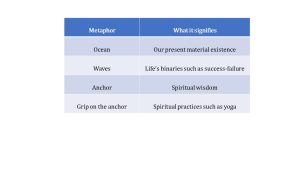 Suppose we are in an ocean characterized by huge waves. How can we protect ourselves from being swept away by those waves? By having an anchor to hold on to and by holding on to that anchor.
Suppose we are in an ocean characterized by huge waves. How can we protect ourselves from being swept away by those waves? By having an anchor to hold on to and by holding on to that anchor.
The world we live in is like an ocean, wherein occur waves in the form of life’s dualities such as pleasure-pain, profit-loss, honor-dishonor and union-separation. If we are heavily emotionally invested in attaining the positive side of a binary or avoiding its negative side, our self-image will be accordingly shaped, even defined. Thus, if we strongly crave good grades in an exam, getting the opposite will be like a wave that smashes and shatters us. It will send our self-image on a drastic downturn — we will see our poor academic performance not just as a setback, but as a crushing loss that defines us as a loser.
How can we protect our self-image from such distortion? By having the anchor of spiritual wisdom that intellectually convinces us about our essential identity. And by holding on to that anchor through spiritual practices that give us experience of our spirituality.
Bhagavad-gita provides us that wisdom, especially in its explanation of the various levels of the self — material and spiritual — and in its delineation of the soul as both transcending and sustaining our other levels of self-identification (02.23). And the Gita offers time-tested practices of yoga that can enable us to realize the spiritual side of reality (09.02).
When we study spiritual wisdom consistently and engage in spiritual practices as a regular discipline, we will become less affected by life’s binaries and better situated in our essential identity (05.20).
One-sentence summary:
To prevent our self-image from being distorted by life’s binaries, we need both spiritual wisdom as an anchor and spiritual practices as means to hold on to that anchor.
Think it over:
- How is our predicament like that of a person in an ocean?
- How can spiritual wisdom help us?
- How can spiritual practices help us?
***
05.20 A person who neither rejoices upon achieving something pleasant nor laments upon obtaining something unpleasant, who is self-intelligent, who is unbewildered, and who knows the science of God is already situated in transcendence.
To know more about this verse, please click on the image


Spiritual wisdom is attained by JAPA